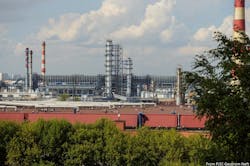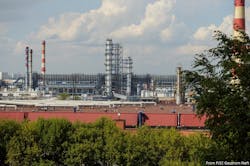Russia’s PJSC Gazprom Neft, St. Petersburg, has started construction of a water treatment plant for sulfur-alkaline waste and process condensate as part of the ongoing modernization and upgrade of its 12.15 million-tonne/year Moscow refinery (OGJ Online, Dec. 3, 2014; July 19, 2013; May 7, 2013).
With a total operational capacity of 120 cu m/hr, the plant is designed to remove sulfides and ammonia-nitrogen from refinery wastewater, with full wastewater treatment to be managed by two independent sections of the plant, Gazprom Neft said.
A first section will handle the cleaning of effluents from currently operating installations at the refinery, including the visbreaking unit, light-naphtha isomerisation unit, diesel hydrocracking unit, and fluid catalytic cracking unit, among others, the operator said.
A second section of the treatment plant will be dedicated to wastewater it receives from the long-planned combined oil refinery unit (CORU) now under construction at the Moscow manufacturing site (OGJ Online, June 19, 2015).
Designed to use its own runoff water for heating as an energy efficiency measure, the new water treatment plant project also will include construction of a new transformer station at the site to preclude any interruptions to the refinery’s electrical equipment, the company said.
The sulfur-alkaline and process condensate treatment plant at Moscow is due to be commissioned during first-half 2017, Gazprom Neft said.
The Russian operator also confirmed that preparatory works for construction of the Moscow refinery’s proposed biosphere, or multistage biological wastewater treatment system, remains under way (OGJ Online, Jan. 14, 2015).
Once fully commissioned in 2017, the biosphere’s two biological wastewater treatment plants, which are to be merged with an underground, mechanical treatment plant completed at the refinery in 2012 to form part of a single installation, will more than halve the refinery’s current water consumption, allowing 75% of water to be returned to the plant’s production cycle.
The company did not specify when construction would begin on the biosphere-related plants.
In addition to improving efficiency and reducing environmental impacts at the Moscow operations, the modernization and upgrading project, once completed, will increase the refinery’s overall design capacity for crude processing to 18.15 million tpy (OGJ Online, Aug. 26, 2014).

